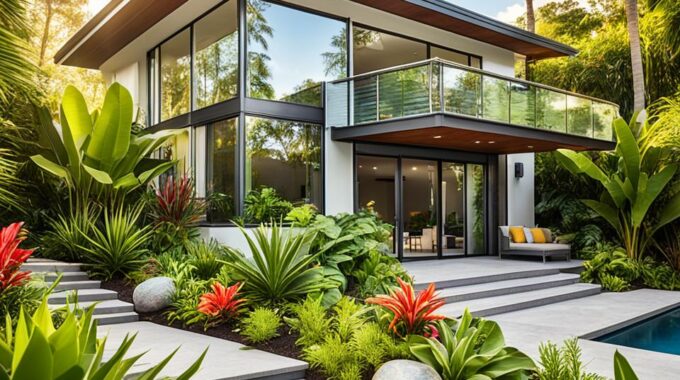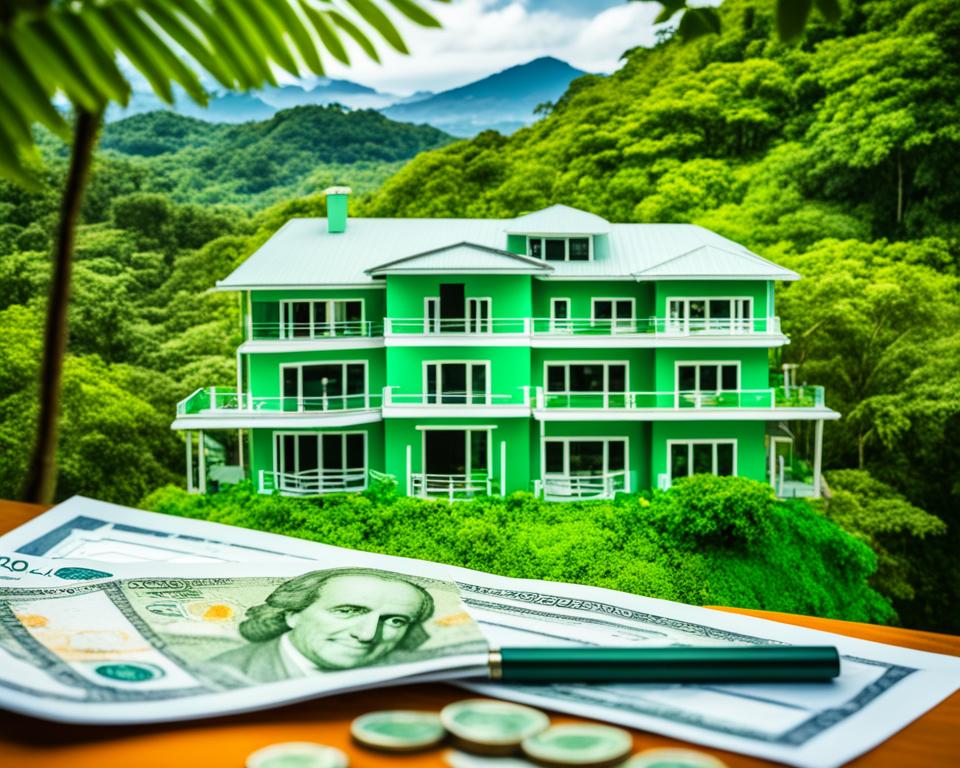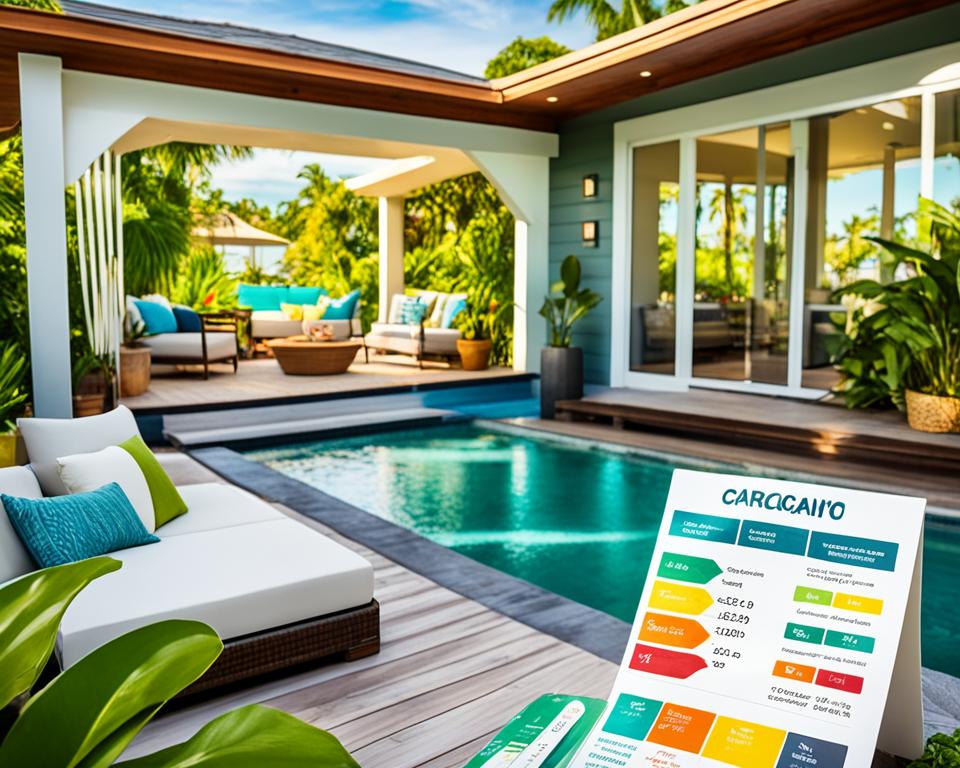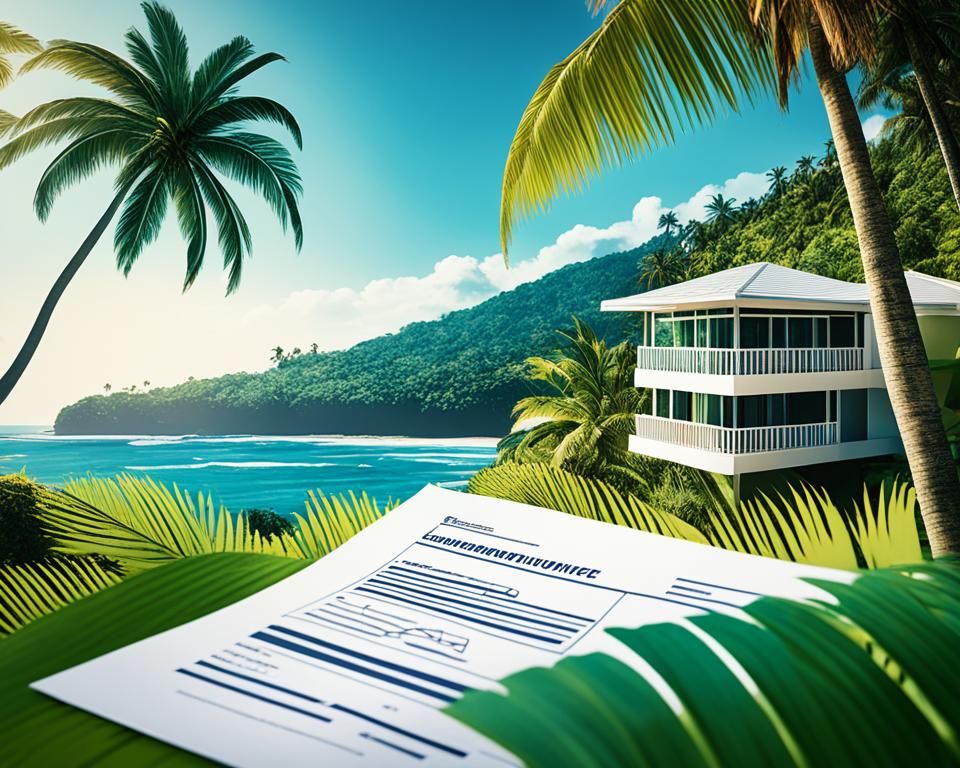Access no credit check home equity loans in Costa Rica with GAP Equity Loans. Borrow $50k to $1M with competitive rates and flexible terms. Simplify your financing process today.

How to Finance a Home in Costa Rica | Expert Guidance With Gapequityloans.com.
Do you dream of owning a bit of paradise in Costa Rica? Whether you’re from around there or an expat finding a tropical escape, knowing the mortgage options is key. The local way of financing is crucial for reaching your real estate dreams. So, how can you ace the Costa Rican mortgage market and get your dream property?
Key Takeaways
- Costa Rican bank financing typically requires a 35-50% down payment.
- Interest rates for U.S. dollar loans range from 7-10%, while loans in colones can reach up to 20%.
- Private banks offer financing to foreigners for vacation homes with terms up to 20 years, 30-50% down, and 8.5-10% interest rates.
- Private lenders may finance up to 70% of the property value at 8-16% interest and loan terms up to 15 years.
- Seller financing in Costa Rica often includes 1-3 year terms, 6-9% interest, and a minimum 50% down payment.
Understanding Costa Rica’s Real Estate Financing Landscape
Looking into buying property in Costa Rica is key for investors or those looking for a new place. It doesn’t matter if you want a vacation home or an investment, knowing about local loans is vital. We’ll look at the hurdles foreigners might face and the unique parts of the Costa Rican market.
Challenges of Financing as a Foreigner
Buying a place in Costa Rica without living there can be tough financially. In general, local banks need a 30-50% down payment. You might pay these off in 20 years with an interest rate between 8.5% to 10%. Alternative lenders might ask for less upfront, up to 70%, but rates could be 8% to 16%.
Importance of Understanding Financing Options
Getting to know your financing choices is important in Costa Rica. You can find traditional mortgages, loans from existing home equity, and even direct financing from sellers. Knowing the details like what the down payment or interest might be helps you pick what fits your budget and dream property.
Costa Rica’s Real Estate Market Overview
Knowing about Costa Rica’s real estate as a whole can help with financing. It includes where the best properties are and who’s buying. This info can give you a big-picture view for good investment choices.
Location and Demand Dynamics
Areas like the Pacific Coast have gotten a lot of attention, boosting demand. The pull is largely due to Costa Rica’s beauty, steady economy, and vibrant tourism. This demand affects what kind of loans are available for buyers.
Property Types and Prices
The Costa Rican market has everything from luxury beach homes to more budget-friendly options. Prices change with the location and what each place offers. Knowing this can guide your search for the right financial plan.
Infrastructure and Tourism Influence
Costa Rica’s strong infrastructure and tourism boost its real estate appeal. Better access, top-notch features, and a solid economy make the market attractive. This has led to various financing choices for locals and foreigners.

Conventional Mortgage Options
When you want to buy a home in Costa Rica, many people choose a conventional mortgage. Local residents and newcomers find it a familiar way to own a house. Costa Rican banks offer these types of loans.
Fixed-Rate Mortgages
Fixed-rate mortgages are quite popular in Costa Rica. With these loans, the interest rate stays the same for the whole repayment time. You can choose to pay back the money in 10 to 30 years. Knowing your payment won’t change can help make budgeting easier.
Adjustable-Rate Mortgages
Adjustable-rate mortgages (ARMs) work a bit differently. The interest rate can change over time, usually starting low for an initial period. While these loans may have lower early payments, remember rates can go up. This brings both risk and potential benefit.
Government-Backed Mortgages
Costa Rica also has government-backed mortgage options. These include support from the Costa Rican Housing Mortgage Bank (BANHVI). For qualified applicants, these programs may offer more help and better loan conditions.

How to Finance a Home in Costa Rica
Buying a house in Costa Rica might seem hard, but there’re many paths to help you succeed. You can consider using home equity loans, interest-only loans, or even negotiate with the seller. Let’s look at these ways to get your dream place in paradise.
Home Equity Loans
Many expats and those buying from abroad like home equity loans for financing properties in Costa Rica. You use your current home’s value to get more money. Loan sizes go from $50,000 USD to over $1,000,000 USD, depending on your home’s equity. The interest rates on these loans range from 12% to 16%, competing with bank rates.
Interest-Only Loans
Interest-only loans offer another path for foreign home ownership in Costa Rica. With these, you only pay the interest each month, which might make payments easier. They are good for cross-border lending and expat financing because they are more flexible than regular mortgages.
Seller Financing
Occasionally, the seller might directly finance your purchase in Costa Rica. This can benefit those looking for mortgages from abroad and land investing internationally. It avoids the usual bank steps. In such cases, buyers and sellers can discuss the terms. This gives more real estate financing options and expat mortgages for buying a home in Costa Rica.
Choosing a home equity loan, interest-only loan, or seller financing offers many finance paths in Costa Rica. The important thing is to know the financing requirements for costa rica homes and look into the home financing options in costa rica that match your plans and budget.

Mortgage Process and Requirements
Getting a mortgage in Costa Rica might seem tough if it’s your first time or you’re from another country. Borrowers usually have to give a lot of documents. This list includes the house’s purchase agreement, proof of income, your ID, Social Security numbers, and several months of bank statements. It’s wise to work with experienced mortgage brokers and real estate agents. They will help you understand what you need and handle the process smoothly.
Documentation Checklist
For a mortgage in Costa Rica, you’ll need to show your purchase agreement, income confirmation, and ID. You also need to show bank statements for the last six months from accounts like savings, checking, and investments.
Role of Mortgage Brokers and Real Estate Agents
Talking to professional mortgage brokers and real estate agents makes buying a home easier. They help you find the best mortgage, make sure you’ve got the right documents, and talk to lenders. This helps make the whole process go well.
Mortgage Rates and Costs
How much you pay for a mortgage in Costa Rica is based on a few things. This includes the economy, inflation, and how the world markets are doing. The average interest rate is 14.04%, from data between 2001 and 2023. But, don’t forget about other costs like origination and appraisal fees, legal fees, and closing costs. These can make up a big part of what you owe.
Interest Rate Trends
The interest rates in Costa Rica have stayed about the same for many years. They usually stay around 14.04%, based on numbers from 2001 to 2023. But, remember that interest rates can change. They are affected by how the economy is doing and by trends in the world’s finances.
Additional Fees and Closing Costs
When buying a home in Costa Rica, you must think about more than just the mortgage rate. There are extra fees and closing costs, like origination and appraisal fees, legal fees, and a mortgage registration fee. Altogether, these can be about 1.64% of the mortgage. It’s important to keep these costs in mind when planning your home purchase.

Conclusion
In Costa Rica, finding money for a home can be complex. There are many ways to fund a home, from regular mortgages to private lenders. It’s important to know the details of how real estate financing in Costa Rica works for a smooth process. This is crucial whether you live there or are moving for the first time.
You can choose from many types of loans, like fixed or variable rates. Also, you might consider using your home’s value or having the seller help finance your buy. It might seem like a lot, but with good advice and looking into your options, you’ll find the best way to fund your home. This is especially true in a market that is lively and keeps growing.
When looking at what’s out there, think about interest rates and how much you need to pay upfront. Also, look at the loan’s conditions and any special rules for people from other countries. Having a team of skilled people around you, like brokers and real estate agents, will make the process easier. They can help you navigate well, so you get the home you’ve always wanted in Costa Rica.
FAQ
What are the mortgage options for financing a home in Costa Rica?
Costa Rica offers fixed-rate, adjustable-rate mortgages, and government-backed plans for home buying. It’s important to know what’s out there when looking to invest in Costa Rican real estate. This knowledge is beneficial for both locals and those moving to Costa Rica.
What are the challenges of financing a home as a foreigner in Costa Rica?
For foreigners buying a home in Costa Rica, there are hurdles like strict document needs and the local banking system. Being well-informed about the buying process and requirements early on is vital. It ensures a smoother path to owning a home.
How can I use home equity loans, interest-only loans, or seller financing to buy a home in Costa Rica?
Beyond traditional mortgages, options like home equity loans, interest-only loans, and seller financing exist for home buying in Costa Rica. It’s wise to carefully assess the benefits and considerations of each method.
What documentation is required to get a mortgage in Costa Rica?
Procuring a mortgage in Costa Rica demands a slew of documents. These include home purchase agreement, income proof, ID, Social Security numbers, and bank statements. Seeking help from skilled mortgage brokers and real estate agents can smoothen this path.
How do mortgage rates and costs compare in Costa Rica?
Mortgage interest rates in Costa Rica fluctuate, raising the importance of not just the rate but also possible fees and closing costs. Being aware of current rate trends and cost structures aids in making well-informed financial choices.
Source Links
- https://www.gapequityloans.com/en/ways-to-finance-a-house-in-costa-rica/
- https://www.gapequityloans.com/en/home-loan-options-in-costa-rica/
- https://www.gapequityloans.com/en/how-to-finance-a-home-in-costa-rica/
- https://osatropicalproperties.com/blog/real-estate-financing-in-costa-rica-can-you-get-a-mortgage-for-a-home-in-costa-rica
- https://www.nikorilifestyles.com/blog/navigating-the-complexities-of-real-estate-ownership-in-costa-rica
- https://gapinvestments.com/en/home-loans-in-costa-rica/
- https://www.gapequityloans.com/en/equity-loans-faq/
- https://www.tresamigos-cr.com/financing-property-costa-rica
- https://flamingobeachrealty.com/financing-options-for-property-buyers-in-costa-rica/
- https://www.gapequityloans.com/en/costa-rica-home-equity-loans/
- https://gapinvestments.com/en/secure-loans-in-costa-rica/
- https://www.remax-oceansurf-cr.com/financing-for-foreigners-in-costa-rica
- https://bluewaterpropertiesofcostarica.com/blog/costa-rica-real-estate-financing-4-options/
- https://www.gapequityloans.com/en/costa-rica-home-equity-loans-guide/
- https://www.specialplacesofcostarica.com/blog/how-to-get-a-mortgage-in-costa-rica/
- https://www.gapequityloans.com/en/construction-loans/
- https://www.propertiesincostarica.com/blog/3-ways-you-can-finance/
- https://crie.cr/financing-a-property-in-costa-rica/
- https://crie.cr/financing-property-in-costa-rica/
Article by Glenn Tellier (Founder of CRIE and Grupo Gap)



